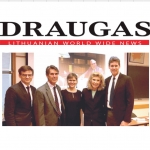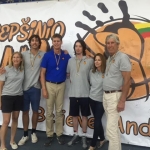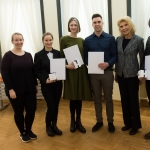News
Audrone V. Skiudaite, a writer for the oldest Lithuanian newspaper published outside of Lithuania "Draugas", talked to Jurate Kazickas about philanthropy, foundations history, its work and future plans.
"Two Most Important Things - Compassion and Generosity. Conversation with the President of the Kazickas Family Foundation, Jurate Kazickas."
It says on the Kazickas Family Foundation's website: "The Kazickas Family's philanthropy is motivated by our wish to create a better world for both current and future generations of Lithuanians." After going through the foundation's web site and reading philanthropist Joseph Peter Kazickas' children's Tributes to their Father, I was assured that this family is truly such - loving and respecting not just one another, but also any person next to you. That person could be anyone who needs help.
It continues on the Kazickas Family Foundation's website: "The Kazickas' "Odyssey of Hope" brought the family to America, the new world of freedom and opportunity, but we never forgot our heritage and the homeland. When Lithuania regained its independence in 1991, we knew we had an opportunity to help Lithuania in its post-Soviet development".
The Kazickas Family Foundation was established in 1998 in New York, USA, and in 1999 in Vilnius, Lithuania. Foundation's founder was a citizen of Lithuania and the US, Pasvalys region honorary citizen, KTU honorary doctor, Yale University Sterling fellow and 1951 PhD in economics, businessman, entrepreneur and philanthropist Dr. Joseph P. Kazickas. Currently, foundation focuses on educational and social projects, it also supports organizations involved in health care, cultural, religious and charitable work. After Alexandra and Dr. Joseph P. Kazickas passing, their four children, Joseph Mindaugas, Michael Vytautas and John Algirdas took over the foundation with Jurate Kazickas serving as a President.
"Draugas" contacted the President of the Kazickas Family foundation Jurate Kazickas, asking to share more about the foundation's work and future plans.
Dear President, do You recall the circumstances the foundation was started and how it operated in the beginning?
My father started Onmitel, one of the first mobile phone companies in Lithuania. Some years later he sold the company, which had become very successful. He wanted to give something back to his homeland for having given him the opportunity to create a very profitable business so late in his life. (He was in his 70s by then.) Therefore he took a sizeable amount of his profits and created the Kazickas Family Foundation.
The mission of the foundation in those early years was focused on education and technology. He donated 4.5 million litas worth of computers and software to almost 300 secondary schools around the country and helped train teachers on how to use them and make the fullest advantage of what was available on the internet. In 2005 the foundation partnered with KTU in establishing the JPK Secondary School Computer Programmers Forum which attracts students from the entire country. Students who excel in this forum are granted extra credits when applying to universities.
What are the most important previous and current foundation’s supported programs in Lithuania and beyond could you name?
I would encourage your readers to look at the KFF web site and read about all our activities which are too numerous to name here.
I think the construction of Valdovu Rumai was very important to my father. He was one of its largest donors. He felt that having such an outstanding architectural statment would enhance Lithuania in the eyes of the western world. Indeed, the opening ceremony of Valdovu Rumai VR was attended by heads of state and rolyalty from all over Europe. As we know, the building is now one of the most impressive structures in Vilnius. It contains a wonderful museum, is used for concerts and private events, and has thousands of visitors every year, especially local citizens and school children.
The other project my father felt very strongly about was the establishment of the Valdas Adamkus Presidential Library which opened in 2016. As you know several American presidents have libraries that house their papers and memorabilia and are also research centers. Dr. Kazickas, who was very close to President Adamkus, knew that having such a library would not only honor the Adamkus legacy, but would bring prestige to Lithuania. The foundation contributed meaningful funds to endow the library.
Some of the other programs we support include ASSIST which sends students for a year of study in private schools in the US; Sacred Music Festival, the Song and Dance Festivals,the Sisters of Immaculate Conception Home in Vilnius, Teach for Lithuania, the Trade School Soziaus Meistrai, the International Christmas Basaar,hospice, Special Olympics and more.
And we are most proud of the Alexandra Kazickas Grant Program, launched in 2012 which provides funds to more than 30 heritage schools throughout the United States. These programs keep alive Lithuanian culture and language for those new immigrant to the US and children and grandchildren of Lithuanian-Americans. That is so important to insure that future generations feel connected to their homeland. Apart from supporting the individual school programs, we also fund teacher training seminars and in 2014, we initiated creation of the Lithuanian Language Proficiency testing system.
Is it possible to track how the grants are spent and used and if they are paying off. Do you see results?
We do try to follow up with out grantees by visiting them in their locales periodically and requiring proof that the funds were used as intended. For example, recipts for the purchase of wheelchairs for the disabledand or a copy of the published book.
One of our proudest gifts (in 2008) was to the Children’s Clinic at Kaunas University Hospital of Health Sciences which provides assistance to 1500 children a year with severe illnesses and trauma. We donated half a million litas for the purchase of eight sets of intensive therapy equipment, including a hospital bed with an artificial lung ventilator. We know many young lives have been saved by our gift and that gives us great satisfaction.
How the Foundation changed after death of Your Father who was the founder of the foundation?
Our focus has always been on education but now we are granting more scholarships to worthy students at KTU. We also instituted two endowments in my father’s name for Lithuanian graduate students at Yale University and the University of Washington in Seattle.
The foundation has also become more involved with various social issues like care for the elderly, the disabled, orphans and youth at risk. In 2014, the eleven members of the younger generatiion of the Kazickas family joined the work of the foundation. Knowing that Lithuania has thousands of children vulnerable to human trafficking, suicide, and in dysfunctional families afflicted with alcoholism, we created the social responsibility program “Basketball Power.” Basketball is being used as a vehicle to reach out to these young people in remote villages and small towns, as well as juvenile detention centers, to offer them free baketball lessons along wth life skills. The program has cultural, educational, recreational and professional education, as well as outings and tournaments. BP works in 16 locations reaching 250 children and is expanding.
As we understand, the Foundation not only has Family’s money but collects support from other donors for some of its programs. Please, name the most faithful collaborator.
We are now asking organizations who want our help to find matching grants that equal the sum of money we are donating. This is a good way of making them be more proactive in finding other donors. We have received support from some other donors including the National Basketball Association which conributed to the construction in 2006 and renovation in 2015 of the outdoor basketball court in Seskine. But we are eager to find other partners to help us with the many causes we support.
Do yo, as the President of the Foundation, have a chance to meet with the recipients and those who donate to the Foundation, or it’s being done by the Foundation’s employees (if there are any)?
The best part of being the President of the Foundation is going to meet with recipients of our gifts. I try to go to Lithuania two or three times a year and visit some of our projects like the convent of Divine Providence of the Sisters of Utena. The sisters always treat me to tea and send me home with homemade honey, cheese or apple butter. I love seeing them!
I enjoy presenting scholarships to the students at KTU and hearing about the projects they are working on and their career ambitions. Twice a year we hold a gathering in our home in Vilnius for ASSIST students and their parents. Those who have just returned from a year of study in the United States are eager to share their experiences with the group that is just leaving.
Likewise, family members and foundation employees constantly communicate with the grant recipients.
How grants are being distributed, how is it determined who gets a grant? What are the grant giving criteria?
First let me say that I have two wonderful directors of the foundation. Zenonas Bedalis is based in Vilnius and Neila Baumiliene manages our office in New York. You can imagine, we get many requests for supporting funds all year long. The majority of the 70 annually supported organizations are long term relationships receiving continuous grants. When new requests come in, the family picks the most urgent issues and also get advice from Lithuanian givernment officials, scholars and diplomats.
We try to give grants to local organzaitions whose work aligns with the foundation’s mission and those we believe will make efficient use of funds and have the biggest impact. As we say in America, we want the “biggest bang for our buck.”
I want to point out, that we DO NOT give funds to individuals. This is not permitted by US tax laws. Only tax exempt non-profit organzations that have a status equal to our 501(c)(3) are eligible.
Let me add that we don’t just write a check; we work closely with the select organizations because we want to achieve long term results. As it is now said in the foundation world, “don’t just give money – give your talent, time and ties.”
Organizations must fill out our online application form. Then their work is researched. We always ask what other donors might have made contributions. Transparency in how the charity is operated is important to us. Having an English speaking program manager is always helpful.
Four or five times a year my three brothers and I get together to review the long-standing organizations’ work and decide if we will continue to support them. When new charities come to us, we decide which ones meet our criteria for support. Each of us has an equal vote and the discussions on the merit of the various requests are lively and fun. Who would not enjoy helping programs that improve people’s lives?
What is exciting about the Kazickas Family Foundation now is the involvement of the next generation. There are eleven grandchildren, ages 23-33, and since 2015 they have become actively engaged with our giving. Basketball Power, for example, was the brainchild of Peter Kazickas, the son of Joseph and Lucy. Each grandchild is encouraged to attend our meetings and find at least one charity that is of interest to them, in the US or Lithuania, to which they can donate. They are, after all, the future of the foundation.
We’d like to give you an opportunity to say something to the readers of “Draugas”. What would you like to say?
I want to stress that one does not need to have a foundation or a lot of money to help those less fortunate and make a difference. Even one euro handed to someone who is hungry can save a life. Also, there are other ways to give. We can donate old clothes or toys to a homeless shelter. We can volunteer our time to visit an orphanage or spend an afternoon with someone sick or lonely. It is having a spirit of generosity and compassion that is important. We must love our neighbors as we love ourselves.
Thank you for converstion
by Audrone V. Skiudaite
Photos: KFF archives
Photo above: Jurate Kazickaite at Yale University with her brothers John (first from right) and Michael (second from left), dr. J. P. Kazickas post-doctoral fellow at Yale dr. V. Davoliute and program's coordinator dr. B. Woodworth, 2016, New Haven.



